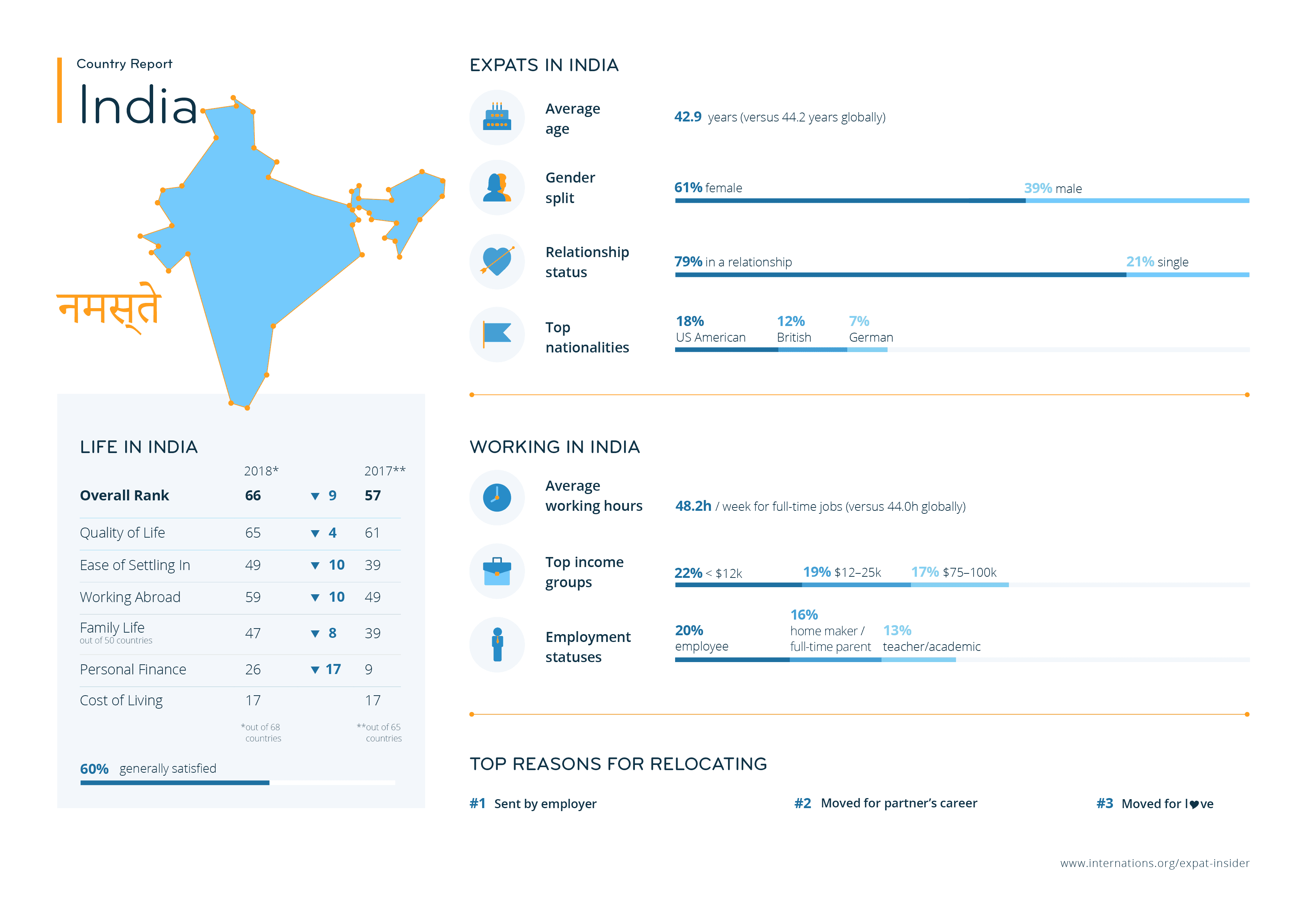A Trade-Off: Long Working Weeks for a Low-Cost Life in India
Expats find themselves working over four hours more than the average global expat, though not without reward: the cost of living in India is among the cheapest in the world.
- Ranking 17th out of 68 countries, the Cost of Living Index is India’s best result.
- Expats face long full-time working weeks with a 48.2-hour average.
- Respondents find it difficult to feel at home.
- In the Digital Life and Leisure Options subcategories, India ranks 65th out of 68.

No Luck with Leisure and Digital Life
Coming in 65th place out of 68 countries in the new Digital Life subcategory, India may not be the best expat destination for those who have high demand for digital technologies. Though four in five expats agree that unrestricted access to online services is quite good, more than half (59%) report a lack of available government services online. Compared to the global average, expats in India are having a much harder time getting a local mobile phone number (50% vs. 86% worldwide find this easy).
India also ranks 65th out of 68 in the Leisure Options subcategory. Respondents are not particularly happy with the climate and weather — less than half (47%) say it’s good compared to 61% globally — and over a third (36%) report negative feelings about the available leisure activities in general, meaning India trails behind on a global scale (13% negative ratings). What is more, not only does India rank last in terms of the quality of the environment, but it comes in second-to-last place for peacefulness as well.
Enjoyable Culture but Always a Foreigner
In terms of feeling welcome, 72% of expats rate the general friendliness of the population positively, and nearly seven in ten (69%) say there is generally a friendly attitude towards foreign residents. An Italian respondent, for example, makes sure to point out “the friendliness and kindness of the local people”.
India makes it very difficult for foreigners to stay in the country on a permanent basis.
Many expats report difficulty feeling at home, though: two-fifths say they do not feel at home in the local culture, and about a quarter of respondents (24%) do not think they ever will feel at home in India. According to one US American respondent, “India makes it very difficult for foreigners to stay in the country on a permanent basis. This makes things like finding a job, securing a visa, opening a bank account, and in general, assimilating into society more difficult for foreigners.”
Slightly over two-thirds of expats in India (68%) say it is easy to live in the country without speaking the local language. Considering the fact that English is an associate official language in India, and that survey results were gathered in English, this is not particularly surprising. Those who do wish to learn the local language(s) may face some difficulties, though: only 2% completely agree that this is easy.
Decent Job Security Not Easily Earned
On average, expats in a full-time position in India report 48.2-hour working weeks, which is over four hours more than the global average of 44.0 hours. India ranks 67th out of 68 in the Work & Leisure subcategory, with only 9% of expats completely satisfied with their work-life balance.
Before moving to India, only around one in ten respondents (11%) considered the economy and/or labor market a potential disadvantage. In fact, more than three in five expats (61%) are generally happy with their job security. This is one of the few factors in which India ranks, with its 23rd place, above the global average.
Family? India Not an Ideal Destination
Not only do expat parents report poor childcare (50th out of 50 destinations) and education options (45th) overall, nearly half (48%) generally disagree that education is easy to afford. Around four in five expat parents (78%), however, have chosen either a local private school or an international school for their children — a likely explanation for the high cost of education.
Family well-being in general ranks last place at 50th out of 50 countries. Although close to three-quarters (73%) report friendly attitudes towards families and children, an above-average portion rate India negatively regarding their children’s health (47% vs. 11% globally) and safety (41% vs. 10% globally). Available leisure activities for children are similarly poorly rated, with not quite two-thirds (64%) giving them bad reviews, and three times the global average (27% vs. 9%) also voicing dissatisfaction with family life in general.
Cost of Living No Reason for Concern
Roughly half of expat households in India (51%) make 50,000 USD or less annually, so it may come as a surprise that two-thirds are quite satisfied with their financial situation: only 17% report not having enough household income to cover everything they need for daily life.
I appreciate the cost of living, as most things are much cheaper.
In the Cost of Living Index, India ranks 17th out of 68. More than seven in ten (71%) rate this factor favorably, and a similar number (72%) also says they considered the cost of living a potential benefit before moving to India. A Canadian respondent “appreciates the cost of living, as most things are much cheaper”.
Further Reading
Advertisement
Join InterNations
The community for expats worldwide
Download

